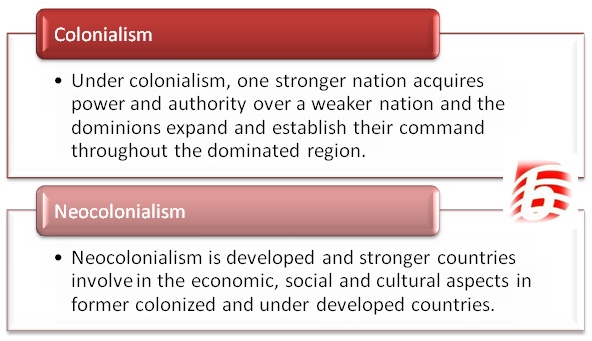Colonialism vs Neocolonialism
Colonialism and neocolonialism may seem similar due to the presence of the word “colonialism” in both terms. However, they are quite different. Colonialism refers to the period between the 1450s and 1970s when stronger nations, such as Spain, Britain, France, and Portugal, established colonies in Asia, Africa, and other regions by taking over weaker nations. These stronger nations exploited the natural and human resources of the subjugated countries. Neocolonialism, on the other hand, is a post-colonial experience where developed and stronger countries involve themselves in the economic, social, and cultural aspects of former colonized and underdeveloped countries.
What is Colonialism?
During the colonial era, most Asian and African regions were dominated by stronger countries, which had sole control over these subjugated nations. Colonialism is the process where one stronger nation acquires power and authority over a weaker nation, expanding its dominion and establishing its command throughout the dominated region. The colonial country exploits the natural and human resources of the colony for its own benefit, usually leading to an unequal relationship between the colonial country and the colony in terms of profit distribution. Colonialism also involved the spread of the colonial country’s religion, beliefs, clothing patterns, food patterns, and other cultural aspects to the subjugated countries. By the end of 1970s, almost all colonies gained independence, putting an end to colonialism.
Key Takeaways
- Colonialism refers to the period when stronger nations established colonies by taking over weaker nations and exploiting their resources.
- Neocolonialism is a post-colonial experience where developed and stronger countries involve themselves in the economic, social, and cultural aspects of former colonized and underdeveloped countries.
- Colonialism involves direct control over a subjugated nation, while neocolonialism involves indirect involvement.
What is Neocolonialism?
Neocolonialism emerged in the post-colonial era and is also known as the use of economic or political pressure by powerful countries to control or influence other countries. Former colonial countries further exploited the former colonies using their economic and political power. Even after gaining independence, the former colonies had to depend on the stronger countries for their needs due to the lack of development during the colonial era. Most social scientists believed that after gaining independence, the colonies would develop themselves in terms of economic and political powers. However, that did not happen, leading to a process known as “Neocolonialism.”
What is the difference between Colonialism and Neocolonialism?
Colonialism involves one stronger nation acquiring power and authority over a weaker nation, expanding its dominion and establishing its command throughout the dominated region. In contrast, neocolonialism involves developed and stronger countries involving themselves in the economic, social, and cultural aspects of former colonized and underdeveloped countries. Both terms involve an unequal relationship between the parties, with one country becoming the dominion and the other becoming the dominated party. However, colonialism is a direct control over a subjugated nation, while neocolonialism is an indirect involvement. Colonialism has ended, but many nations are still experiencing neocolonialism today.
